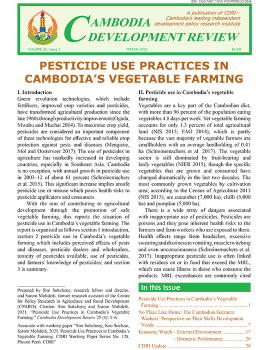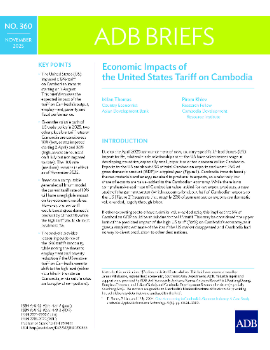
Pesticide Use Practices in Cambodia’s Vegetable Farming
Khmer PDF (104)
Abstract/Summary
Pesticides are agricultural technologies that farmers use to control pests and weeds and remain an important modern input for crop production including vegetable farming. There are many types of pesticides, such as insecticides, fungicides, rodenticides and herbicides, that target different threats to crops. While the potential production benefits of chemical pesticides are undeniable, people are becoming more aware of their risks. There is an array of dangers associated with inappropriate pesticide use. As pesticides are a poison, they pose inherent health risks to the farmers exposed to them. Inappropriate pesticide use has been linked with pesticide residues in or on food above maximum residue levels (MRLs), the safe amount of residue allowed, which can cause a number of health effects in those who consume the products. Our survey data reveals that pests and diseases are the biggest challenge Cambodian vegetable farmers face. Pesticides/herbicides account for the largest share in vegetable production costs in our study areas, suggesting that chemical pesticides are commonly used in vegetable farming in Cambodia, particularly our study areas which are the main producers of vegetables in the country. Additionally, it is common that farmers mix various types of pesticides per spray which is not good practice.
Applying ordinary least squares regression and probit model, we investigated the factors that facilitate or impede pesticide use practices. The results show that lower use of pesticide is associated with age of farmers in charge of pesticide spraying, educational attainment, female farmer, and varied by locations. At the same time, there is a significant link between the use of large quantities of pesticide and farmers’ misperception of pesticide use practices and the proportion of pesticide spending in total input costs. Apart from this, knowledge/advice about pest management/control farmers receive from their peers and pesticide stores, household participation in social groups such as agricultural cooperatives, and farm size are positively correlated with the probability that a farmer will comply with recommended pesticide doses. These results imply that modifying farmers’ attitudes towards pesticide use and promoting the role of women in vegetable pest management are among the important interventions to reduce pesticide dependence.



